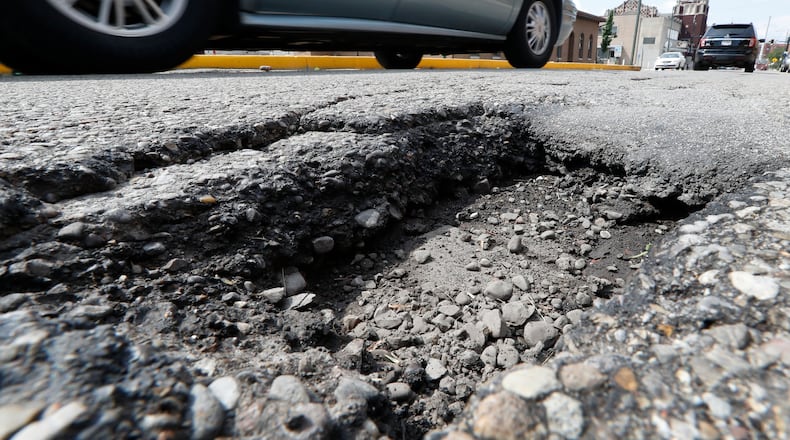The commissioners didn’t take formal action, but all three favor giving Wilkens $1.25 million for county roads, a $200,000 base for each township and with the additional allocations the range is $526,229 for West Chester Twp. to $216,165 for tiny Lemon Twp. The county maintains 266 miles, West Chester 227 and Lemon Twp. 11.
Wilkens recommended a $250,000 base because it brought the per-township amounts the closest together. Commissioner Cindy Carpenter at first advocated for $225,000 but later changed her mind after Commissioner T.C. Rogers made his case for the $200,000 base.
“In the grand scheme of things it could be equal but remember he has not put in lane miles,” Rogers said. “So some of these larger townships have more lane miles.”
Straight miles are one measure, but many county and large township roads have multiple lanes — the county has 617 lane miles — and cost more to resurface.
Carpenter asked Wilkens if this money will make a dent in the townships’ paving programs.
“Some of the smaller townships really struggle with getting money more than even the larger townships quite honestly,” Wilkens replied. “The larger townships surely have got needs because they’ve got more miles. But some of the smaller townships find it really difficult to get the dollars together.”
Cities in Butler County manage their own road maintenance and paving programs, but Wilkens’ office bids and supervises township road projects. The townships pay for the work. Since the additional projects will require more work for Wilkens’ staff the commissioners also plan to give him an administrative fee to cover those costs.
That amount is still to be determined, but the commissioners don’t want it to come off the $5 million.
The commissioners’ funding requests total about $200 million, including 34 proposals totaling $148 million they held work sessions on from various other governments and groups last summer. The commissioners sifted through them all individually and did their due diligence, vetting the projects that ranged from economic development, workforce development, social services, infrastructure, healthcare, bike trail expansion and a new county morgue to name a few.
Helping townships fix their roads was not on the original list but all three commissioners have committed to that project. In their rankings one commissioner recommended $5 million, another $9 million and the third did not list a dollar amount. It is one of three projects the commissioners are advancing first as they begin allocating the funds, along with countywide high-speed internet and demolition and clean-up of the Middletown Paperboard site.
President Joe Biden signed the $1.9 trillion American Rescue Plan Act into law March 11, and it allocated $350 billion to help local governments with pains caused by the coronavirus pandemic.
There have been questions surrounding whether projects like this can be funded with ARPA. The county hired accounting firm Clark Schaefer & Hackett a couple months ago to help them navigate the ARPA regulations.
County Administrator Judi Boyko told the Journal-News the federal government has somewhat relaxed the rigid restrictions on the money. Governments are now allowed to spend up to $10 million on general government services, or they can calculate their revenue loss due to the pandemic. The accounting firm determined that amount is $18 million for the county.
“ARPA has an expense category that’s called general government services and those are things that may not nicely fit into a qualified census tract or a low-to-moderate income, any one of the more specific categories,” Boyko said. “They are not delineated specifically for ARPA expenses which would be health, socially disparate that type of thing... It generally appears this would more than likely be that general services allowance.”
Wilkens has been asking the commissioners for more money for his paving program for years and Dixon told him he’s ready to part with some more general fund dollars this year. Wilkens jokingly clutched his chest feigning a heart attack and Rogers said “am I sitting here next to Santa Claus.”
“We will live up to that commitment this year,” Dixon said.
Dixon told the Journal-News he envisions giving Wilkens $2 million to $5 million out of the $15 million capital improvement reserve.
With fuel prices and inflation exploding costs for road work projects — costs increased 40% for paving —some townships were considering trimming back their paving programs this year but held fast.
Ross Twp. trustees approved a $340,895 paving program that includes four roads and if the commissioners approve the supplemental money the township will receive $279,661. Trustee Board President Ellen Yordy said she is grateful to the commissioners for considering giving them money for paving and to Wilkens for equitably distributing the funds.
“I like the fact that Wilkens’ proposals were all three of them trying to keep them as equal as possible for all the townships,” Yordy said. “Usually the larger townships get the most because they are big and they’ve got more roads. But by the same way smaller townships don’t have the avenues to collect any additional money for repairing the roads.”
About the Author

